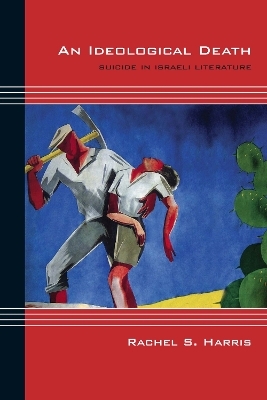
An Ideological Death
Suicide in Israeli Literature
Seiten
2021
Northwestern University Press (Verlag)
978-0-8101-4379-1 (ISBN)
Northwestern University Press (Verlag)
978-0-8101-4379-1 (ISBN)
Examines literary challenges to Israel's national narratives. The centrality of the army, the mythology of the ""new Jew,"" the vision of the first Israeli city, Tel Aviv, and the very process by which a nation's history is constructed are confronted in fiction by many prominent Israeli writers.
An Ideological Death: Suicide in Israeli Literature examines literary challenges to Israel's national narratives. The centrality of the army, the mythology of the "new Jew," the vision of the first Israeli city, Tel Aviv, and the very process by which a nation's history is constructed are confronted in fiction by many prominent Israeli writers.
Using the image of suicide, A. B. Yehoshua, Amos Oz, Etgar Keret, Yehudit Katzir, Alon Hilu, Yaakov Shabtai, Benjamin Tammuz, and Yehoshua Kenaz each engage in a critical and rhetorical process that examines the nation's formation and reconsiders myths at the heart of the Zionist project. In Israeli literature, suicide represents a society's compulsion to create impossible ideals that leave its populace disappointed and deluded. Yet, as Rachel S. Harris shows, even at their harshest these writers also represent the idealism that helped build Israel as a modern nation-state.
An Ideological Death: Suicide in Israeli Literature examines literary challenges to Israel's national narratives. The centrality of the army, the mythology of the "new Jew," the vision of the first Israeli city, Tel Aviv, and the very process by which a nation's history is constructed are confronted in fiction by many prominent Israeli writers.
Using the image of suicide, A. B. Yehoshua, Amos Oz, Etgar Keret, Yehudit Katzir, Alon Hilu, Yaakov Shabtai, Benjamin Tammuz, and Yehoshua Kenaz each engage in a critical and rhetorical process that examines the nation's formation and reconsiders myths at the heart of the Zionist project. In Israeli literature, suicide represents a society's compulsion to create impossible ideals that leave its populace disappointed and deluded. Yet, as Rachel S. Harris shows, even at their harshest these writers also represent the idealism that helped build Israel as a modern nation-state.
Rachel S. Harris is an assistant professor of Israeli literature and culture at the University of Illinois.
Danny ( A Note in Memory)
Introduction
Chapter 1: Samson’s Suicide: The Sabra-Soldier Hero
Chapter 2: The IDF: Training Base Four with all the Cripples
Chapter 3: Unfortunate Suicides: Rewriting Narrative
Chapter 4: Tel Aviv Necropolis
Chapter 5: Nothing Left to Live For: Women’s Suicide
Chapter 6: Suicide in Fiction: Suicide in Life?
Bibliography
Index
| Erscheinungsdatum | 17.06.2021 |
|---|---|
| Reihe/Serie | Cultural Expressions of World War II |
| Verlagsort | Evanston |
| Sprache | englisch |
| Maße | 152 x 229 mm |
| Gewicht | 390 g |
| Themenwelt | Geisteswissenschaften ► Sprach- / Literaturwissenschaft ► Anglistik / Amerikanistik |
| Geisteswissenschaften ► Sprach- / Literaturwissenschaft ► Literaturwissenschaft | |
| Sozialwissenschaften ► Soziologie ► Mikrosoziologie | |
| ISBN-10 | 0-8101-4379-8 / 0810143798 |
| ISBN-13 | 978-0-8101-4379-1 / 9780810143791 |
| Zustand | Neuware |
| Haben Sie eine Frage zum Produkt? |
Mehr entdecken
aus dem Bereich
aus dem Bereich
Poetik eines sozialen Urteils
Buch | Hardcover (2023)
De Gruyter (Verlag)
59,95 €
Buch | Softcover (2024)
belleville (Verlag)
20,00 €


